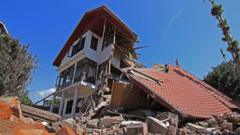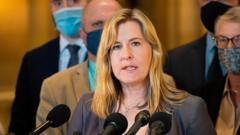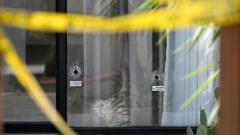In a significant escalation of the response to last week’s attack near Pahalgam, which resulted in the deaths of 26 individuals, Indian authorities in Kashmir have begun demolishing the homes of at least 10 suspected militants. The demolitions, part of broader security operations, have involved the use of explosives since the incident occurred on Tuesday. While the Indian government holds Pakistan responsible for supporting the alleged militants, no specific group has been named in the accusations, a claim that Islamabad has firmly rejected.
India Intensifies Operations After Deadly Kashmir Attack

India Intensifies Operations After Deadly Kashmir Attack
In the wake of a devastating attack in Kashmir, authorities are demolishing homes of alleged militants as investigations continue into the tragic loss of life.
This represents the deadliest attack on civilians in the region in two decades, igniting fears of increased military action and heightening tensions in the long-disputed territory controlled by both India and Pakistan. Indian forces have detained over 1,500 people for questioning following the attack, and reports indicate that more detentions are ongoing, though official numbers remain unclear.
The targeted demolitions have drawn criticism from local leaders, including Jammu and Kashmir Chief Minister Omar Abdullah, who suggested that accountability should not come at the cost of innocents. Former chief minister Mehbooba Mufti also called for careful distinction between militants and civilians, echoing a larger concern about the implications of such punitive actions.
As investigations progress, police have identified three suspected attackers linked to the shooting, of which two are reportedly from Pakistan and one hails from the local region. Survivors of the attack have indicated that the gunmen targeted specific individuals, particularly Hindu men. In response, Prime Minister Narendra Modi vowed to pursue the attackers relentlessly and ensure they face severe consequences.
Bilateral tensions between India and Pakistan have surged since the attack, prompting India to suspend the longstanding Indus Waters Treaty, which governs water distribution between the two nations. Pakistan, in turn, suspended the Simla Agreement aimed at peaceful resolution of disputes, leading to diplomatic expulsions and visa revocations affecting hundreds of nationals on both sides.
As skirmishes along the Line of Control persist, concerns grow for the safety of Kashmiri students studying in other regions of India, who have reported increased threats and hostility from locals. Amidst this unrest, calls for international dialogue have emerged from U.S. and U.K. officials urging both nations to seek a responsible resolution to the escalating conflict.
By Neyaz Farooquee and reported from Srinagar.
The targeted demolitions have drawn criticism from local leaders, including Jammu and Kashmir Chief Minister Omar Abdullah, who suggested that accountability should not come at the cost of innocents. Former chief minister Mehbooba Mufti also called for careful distinction between militants and civilians, echoing a larger concern about the implications of such punitive actions.
As investigations progress, police have identified three suspected attackers linked to the shooting, of which two are reportedly from Pakistan and one hails from the local region. Survivors of the attack have indicated that the gunmen targeted specific individuals, particularly Hindu men. In response, Prime Minister Narendra Modi vowed to pursue the attackers relentlessly and ensure they face severe consequences.
Bilateral tensions between India and Pakistan have surged since the attack, prompting India to suspend the longstanding Indus Waters Treaty, which governs water distribution between the two nations. Pakistan, in turn, suspended the Simla Agreement aimed at peaceful resolution of disputes, leading to diplomatic expulsions and visa revocations affecting hundreds of nationals on both sides.
As skirmishes along the Line of Control persist, concerns grow for the safety of Kashmiri students studying in other regions of India, who have reported increased threats and hostility from locals. Amidst this unrest, calls for international dialogue have emerged from U.S. and U.K. officials urging both nations to seek a responsible resolution to the escalating conflict.
By Neyaz Farooquee and reported from Srinagar.






















